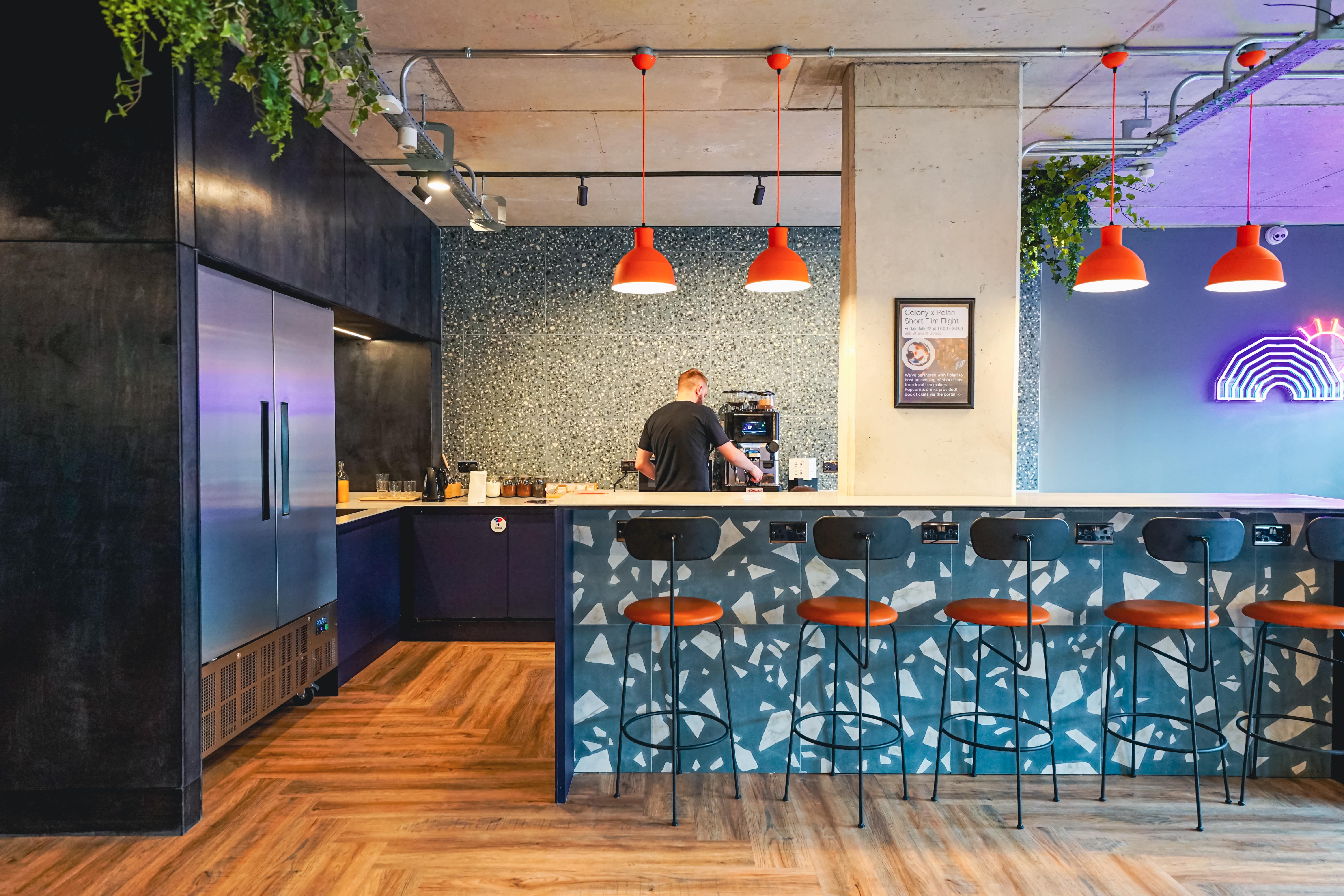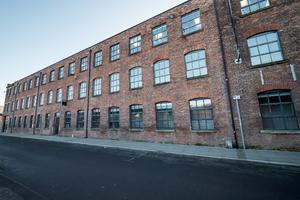What Is A Serviced Office?

13 December 2024
If you’re curious to know more about the benefits of serviced offices, or just want to know what a serviced office is, our informative guide has all the answers.
What Is A Serviced Office?
The traditional office set-up many of us were used to has been overshadowed by more flexible alternatives. With the rise of remote working and a shift in attitudes, companies are looking for practical workspaces with lower overheads and greater versatility. That’s where serviced offices come in.
What is a serviced office?
A serviced office is a fully equipped and managed office space that’s available for rent on a short-term or flexible basis. They typically come with a range of amenities included, such as furniture, high-speed brandband, reception services, and meeting rooms.
Serviced offices are a convenient solution for many types of professionals, from freelancers and consultants to start-ups and larger companies. With benefits including flexible terms and fully furnished workspaces, a serviced office allows entrepreneurs and businesses to easily scale their operations. With none of the hassle of setting up their own office or being tied into a long lease agreement, a serviced office is a far more attractive and cost-effective option for many.
In this article, we'll explore exactly what is included with serviced offices, the advantages of renting one, and tips for finding the perfect space that aligns with your business needs.
The differences between a serviced office and traditional office
A serviced office differs in a number of ways from a serviced office. The key differences to expect include:
Serviced offices
> Offer short-term lease agreements, often as flexible as month-to-month, which is ideal for businesses that need agility to scale up or down quickly
> Come fully furnished and ready to use immediately, with utilities set up in advance and managed by a third party who handles cleaning, maintenance, and IT support
> You’ll typically pay an all-inclusive fee covering rent, utilities, internet, cleaning, and shared facilities. This could mean a higher per-square-foot cost compared to traditional offices but no hidden expenses
> Facilities like meeting rooms, break rooms, reception areas, and even cafes are included in the cost. Other services such as receptionists and mail handling can be included too
> Often located in central areas, providing businesses with premium addresses and access to public transport and restaurants and bars
> Serviced offices are preferred by startups, freelancers, project-based teams, and small to medium organisations, as they are great for those prioritising flexibility and ease of setup
Traditional offices
> Often require long-term lease commitments, typically 3 - 10 years and are better suited to businesses with consistent and predictable growth
> Businesses need to furnish and equip the space themselves, including furniture, IT equipment, and utilities. They also need to organise maintenance and management
> Often cheaper per-square-foot but come with separate costs for utilities, internet, maintenance, and other overheads. Upfront expenses include furnishing, setup, and security deposits also need to be paid
> Amenities depend on what the tenant chooses to set up or negotiate with the building owner with additional services usually arranged and paid for separately
> Securing premium addresses can incur a higher cost whilst out of town locations are cheaper but with less opportunities for networking or after work entertainment
> Suitable for established companies with stable operations and a clear long-term vision, or businesses that need to customise their workspace to specific needs

What is included in serviced offices?
Serviced offices come with the great bonus of being ready-made office spaces, which means that furniture, amenities and utility bills are taken care of. When you rent a serviced office space, the most common features to expect include:
1. Flexible lease agreements
A key feature of serviced offices is their flexible lease terms. Conventional office leases usually mean a long-term commitment, but with serviced offices, businesses are able to rent spaces for shorter periods. This flexibility is ideal for companies experiencing sustained growth who may need a larger office at some point, or new businesses still figuring out their exact staffing needs. Not being locked into a long-term lease agreement also results in reduced overheads.
2. Fully equipped workspaces
Serviced offices come fully equipped with everything you need for a productive work environment. This includes phone lines, administration services, and kitchens for those all-important cups of coffee. The added burden of not needing to pay for or source this equipment, or to set up various utilities, saves considerable amounts of time and lowers outgoings. Business owners and their teams are able to focus on their work from day one.
3. Essential amenities and services
Serviced offices provide essential amenities and services that support business operations. This includes access to meeting rooms, private spaces and breakout areas, as well as practical services, such as 24-hour reception desks and security staff. Shared kitchens are a common feature of serviced offices, and often come stocked with refreshments, large fridges and plenty of bowls, plates and cutlery. Utilities like electricity and heating, and maintenance and cleaning are often included in serviced office costs. Companies get quick access to all the necessary resources without the hassle of managing multiple service providers.
Benefits of serviced offices
Now that we’ve explored exactly what you can expect, let’s look at some key benefits of serviced offices.
1. Cost-effectiveness
For businesses, one of the main benefits of serviced offices is their cost-effectiveness. With an all-inclusive fee that also includes business rates, overheads are significantly reduced and monthly costs are predictable, making budgeting much easier for business owners or finance directors.
2. Immediate move-in readiness
Serviced offices are turn-key ready. Businesses can move in quickly without waiting for complicated long-term leases to be processed. Workspaces usually come fully furnished with ergonomic furniture, and are designed specifically to improve productivity and enhance motivation. It’s perfect for companies needing a speedy start, and also allows for quick adaptation and continued growth.
3. Networking opportunities
Networking is one of the definite benefits of serviced offices. Sharing office space with other companies creates opportunities for collaboration and helps to grow connections. Serviced offices from Colony host regular events to encourage networking and bring together professionals from all sectors. The social environment can lead to partnerships and innovation, and creates a real sense of community that makes spending a day in the office much more fun.

What to consider when choosing a serviced office
Selecting the right serviced office for your business is essential. It affects your daily operations, long-term growth and employee satisfaction. Here are a few key factors to consider when choosing a serviced office.
1. Location
The location of your office space matters. A centrally located office is accessible for clients and is great for attracting top talent. Look at the available public transport and nearby necessities like cafes and banks. Having somewhere for after-work drinks or client lunches can also be an advantage. Colony has several locations throughout Manchester, so you can set to work in a serviced office in Ancoats, the Northern Quarter or Piccadilly, and enjoy the best of Manchester City Centre.
2. Size and layout
It’s important to make sure the office size suits your team's needs. If your business is growing steadily, you need to know you have a space that can accommodate changes. The layout should support your workflow, whether you need private offices, or a bank of dedicated desks that work better for small teams and collaboration. A serviced office with multiple membership options can satisfy all of your needs.
3. Serviced office costs and contract terms
With serviced offices often coming with flexible terms, look at the contract to check exactly what the fees cover. Features to look for include:
- Rent
- Business rates
- Utilities, for example, broadband and printing
- Services such as cleaning and maintenance
Understanding the monthly serviced office costs and any other charges is key to managing your business overheads. Compare these costs with a conventional office lease to see the key differences.
4. Professional services
Secretarial services will often come as part of the package with a serviced office, which can include mail handling, staffed receptions, and IT support. Having these elements not only reduces overhead costs, but also frees up time otherwise spent sourcing admin support elsewhere. Check what professional services are available and if they're included in your fees for a stress-free working life.
How to find the right serviced office
Finding the perfect serviced office can be a game-changer. As well as all the great benefits of serviced offices, having a space that you enjoy working in and is designed for both function and style can enhance your working day. Here's how you can find the right serviced office to match your needs and your wants:
1. Make a list
Before you start the process of looking for a serviced office, assess what your business requires. This can include the bare minimum, such as internet access and furniture, as well as desirables like a coffee machine or even a podcast studio. Do you need a fully private office, or will a bank of dedicated desks be enough? You should also consider business growth and how much space you may need in the future.
2. Book a tour
Once you've identified your needs, visit the office buildings you like the most. Check the location, look at the private office spaces, and meet the support team. Pay attention to the environment and the atmosphere, as well as the amenities. Ask as many questions as you want and check off your list of requirements to see how close a match the space is. Colony offers all prospective members a tour of our buildings, so they can make an informed choice and get a feel for how we do things.
3. Review the serviced office costs
Make sure you have a clear understanding of the serviced office costs you’ll need to pay and the arrangements for doing so. Find out exactly what is and isn’t included, and compare this with traditional office leases or other serviced offices in the area. The flexibility that comes with renting a serviced office often means there’s scope to adjust overhead costs as your business evolves.
Serviced offices from Colony
Choosing the place you want to work in every day, or even just part of the week, is a big decision and one that can have an impact on your bottom line, productivity and staff morale. Colony has a number of meticulously planned and curated office spaces designed around the needs of modern companies and the changing face of today’s work culture. Contact us to find out more about any of our serviced offices and how Colony can help you work smarter.






